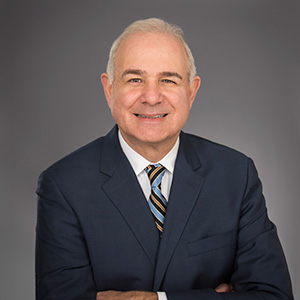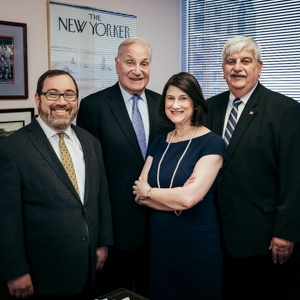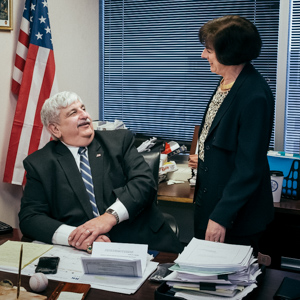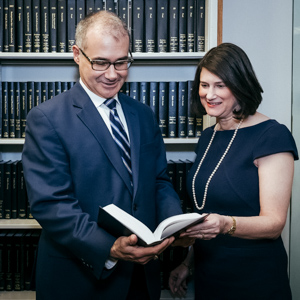Representative Matters
Matter of Elizabeth R. Salerno (Sur. Ct., Westchester Co., 9-27-2023 – File No. 2021-2603)
Frank W. Streng, Irma K. Nimetz


Surrogate’s Court Litigation – Changing Beneficiaries of an Irrevocable Trust Agreement – Reformation of Trust Agreement or Will
McCarthy Fingar’s lawyers often represent clients in will and trust contests. Typically, such contests often involve decedents allegedly changing their wills or trust agreement and removing family or nonfamily members as beneficiaries. Here, two of our Surrogate’s Court litigators, Frank W. Streng and Irma K. Nimetz, represented a child who had been removed as beneficiary of an irrevocable trust agreement, which is an agreement that cannot be changed. The decedent made the following statement in her trust agreement: “Amendment and revocation. The Grantor does not reserve the right to revoke or amend this trust; the trust shall be irrevocable.” Yet, in an effort to convince the Westchester Surrogate’s Court that the decedent’s change of her irrevocable trust should be accepted, the other side argued that she intended to reserve the right to amend the trust and to change beneficiaries. Specifically, they asked the Court to “reform” the trust agreement, arguing that the lawyer who prepared the irrevocable trust agreement had, through an omission, made a mistake; and that the decedent had intended to reserve her right to change the beneficiaries. To support their case, they filed with the Court an attorney’s affirmation in which the attorney explained the decedent’s intention and stated that she, the lawyer, made a mistake. The Court rejected the “reformation” argument, finding that the language of the irrevocable trust agreement was unambiguous, thereby rejecting any efforts to introduce “extrinsic” evidence. Accepting McCarthy Fingar’s arguments, the Court determined that the decedent could not amend her irrevocable trust agreement, thereby permitting our client to continue to be a beneficiary of the trust agreement. The Court held as follows: “[C]ourts do not consider extrinsic evidence of intent where, as is the case here, the trust instrument itself is unambiguous.”
[Read in full]Matter of Rappaport, File No. 2010-2371 (Surr. Ct., NY County – 12-1-2023)

Surrogate’s Court Litigation – Enforcing Settlement Agreements – Assessment of Attorney Fees under Matter of Hyde
McCarthy Fingar’s lawyers are powerful advocates for our clients, and go to trial before judge and juries on our clients’ cases. However, most cases settle, often after complex settlement negotiations. In Matter of Rappaport, Frank W. Streng, representing an executor under the Will and trustees of trusts, negotiated the terms and conditions of a settlement in Surrogate’s Court, New York County. The settlement was then agreed to on the record before Surrogate Hilary Gingold, in which Frank’s adversary was represented by multiple attorneys. In view of the need for others to join the settlement, it was anticipated that there would be a written settlement agreement. But, Frank’s adversary changed his mind: he fired his lawyers and then refused to sign a written settlement agreement that was given to him and others to memorialize the in-court settlement. Frank then made a motion to the Surrogate’s Court to approve the settlement, based upon the adversary’s agreement on the record before the Surrogate. For various reasons described in the decision, Frank’s motion was granted, and his adversary’s cross motion was denied. Frank had another success: applying the principles in the Court of Appeal’s decision in Matter of Hyde, 15 N.Y.3d 179 (2010), Frank asked the Surrogate’s Court to assess legal fees against his adversary that were incurred by McCarthy Fingar in enforcing the settlement. On this issue, the Court ruled as follows: “In determining the sources from which legal fees are to be paid, the court must consider various factors, including, whether the unsuccessful party acted solely in his own interest and whether he acted in good faith (Id at 186-87). Upon consideration of these factors, it is evident that Errol’s conduct in failing to abide by the terms of the settlement agreement negotiated by the parties was frivolous and did not serve the interests of the estate. Thus, his share of the estate must be surcharged for the attorneys’ fees incurred to enforce the settlement in the sum of $31,095.”
[Read in full]Matter of AMH, 2022 N.Y. Slip Op. 00968 (1st Dep’t 2022)

Guardianship Practice – Adult Guardianship – Court Appointed Counsel in Complex Ongoing Guardianship Matter
Lawyers at McCarthy Fingar are often sought out by courts or other attorneys to handle the most difficult guardianship cases. In Matter of AMH, the disgruntled son of nonagenarian AMH, who had not seen his mother for more than 4 years, created turmoil for many years for her and her guardians. At the request of AMH’s court appointed counsel, the lower court appointed McCarthy Fingar partner, Michael S. Kutzin, as litigation counsel to spearhead AMH’s efforts to reduce her Personal Needs Guardian’s powers reduced and to reinstate the health care proxy that AMH had given in 2015 to her daughter (a physician). The 2015 health care proxy had been voided by the lower court because the daughter and AMH’s health care proxy had not been able to work together, but by the time AMH’s application was filed, the daughter and the Personal Needs Guardian had worked well together for a number of years. The son was very litigious: he not only opposed this requested relief, but filed his own application to remove AMH’s longtime counsel, remove the Personal Needs Guardian and to have visitation restrictions (which had been imposed because of his misconduct) lifted. The son also sought to have the lower court compel AMH to testify, even though AMH suffered from health threatening stress when dealing with conflict. After multiple motions and a four-day hearing, Mr. Kutzin and his co-counsel obtained the requested relief for AMH; and the lower court denied everything requested by the son. The son’s litigious efforts continued in the Appellate Division, First Department, where he filed three separate appeals and multiple motions, but to no avail. Mr. Kutzin, leading the efforts in the Appellate Division, persuaded the Appellate Division to uphold the lower court’s decision.
[Read in full]Tax Certiorari – Settlements Made During Trial

Our lawyers know that some cases need to go to trial in order to obtain a good outcome for a client. Stephen Davis, who chairs our Tax Certiorari & Condemnation group, settled a tax certiorari valuation claim in the middle of a trial. Through the settlement, Steve obtained a $1.5 million property assessment reduction, from $4.45 million to $2.95 million. Steve accomplished this result irrespective of an initial asking price on the property of $13 million! Notably, the property consisted of a 1951 Frank Lloyd Wright designed 5,500 sq. ft. house, constructed in 2008 upon a 10.3 ac. island within Lake Mahopac. Many consider this house an architectural rival to Mr. Wright’s renowned Falling Water at Mill Run, Pa.
Matter of Elias Schwartz (Sur. Ct., Westchester Co. 10-25-2022 – File No. 2020-3053/E)
Frank W. Streng, Irma K. Nimetz


Surrogate’s Court Litigation – Gifting through a Power of Attorney of Form – Property Turnover Proceeding
McCarthy Fingar’s lawyers sometimes represent clients in cases, in which, prior to death, there are questions as to whether a valid gift was made by a decedent/decedent’s agent pursuant to an alleged power of attorney. Here, two of our Surrogate’s Court litigators, Frank W. Streng and Irma K. Nimetz, won partial summary judgment and persuaded the Westchester Surrogate’s Court to nullify a gift allegedly made by the decedent’s agent of the decedent’s house pursuant to an invalid power of attorney. In Schwartz, our client’s brother asserted that a trust, in which he was an alleged beneficiary, owned the decedent’s house, and that he was entitled to keep the proceeds of sale of the house that he sold during his father’s lifetime. However, the father did not sign the deed in which the house was transferred to the trust, and the brother had transferred the house through a durable power of attorney form. But, as Frank and Irma pointed out to the Surrogate’s Court, the power of attorney form was flawed: the portion of the form setting forth powers of the agent was not initialed by the decedent, and there was no statutory gift rider, the portion of the form necessary to allow a gift by an agent. As a result, the Surrogate’s Court held that the power of attorney form was not valid, and there was no valid gift. The Surrogate’s, and Court directed that the brother transfer the sum of $685,698.41 to our client as limited administrator of her father’s estate.
[Read in full]Ellis v. Byrne et al. (Sup. Ct., Westchester Co.; 11/21/2022; Index No. 64659/2021)
Irma K. Nimetz, Frank W. Streng


Surrogate’s Court Litigation – Change of Beneficiary Designation – Digital Discovery
McCarthy Fingar’s lawyers know that, to win a case, getting facts and documents through pretrial discovery is essential. Here, two of our Trusts and Estates litigators, Irma K. Nimetz and Frank W. Streng, made and won a motion to compel discovery in a case in which two individuals allegedly used their iphones to change the beneficiary on a decedent’s 401K plan on a financial services company’s web site. In a case involving digital discovery, the Supreme Court, Westchester County, found spoliation, holding as follows: “Defendants ‘turned in’ their iPhones, and obtained replacement devices, while already aware that Plaintiff had accused them of using a computer device to unlawfully change the beneficiary designation. Defendants do not argue otherwise. Thus, Plaintiff has met its burden to establish spoliation.” The Court then directed a turnover to McCarthy Fingar’s lawyers of the defendants’ iphones for forensic examination “along with any information necessary to access all of the images, data, and information in the iPhones.” The Court also directed defendants to answer interrogatories as to their iphones.
[Read in full]Matter of Fischer (Sur. Ct., Rockland Co., 12-5-2022; File No. 2020-587/C)
Frank W. Streng, Ryan J. McLeod


Surrogate’s Court Litigation – Prenuptial Agreements – Spousal Rights
McCarthy Fingar’s Matrimonial lawyers prepare prenuptial agreements and our Surrogate’s Court lawyers litigate the validity of such agreements. Clients make prenuptial agreements when a client is getting married for the second time and desires for his or her prospective spouse to waive rights to elect against the client’s Will or Trust Agreement. The idea is that client wants to give assets to his or her children from a first marriage. Here, two of our Trusts and Estates litigators, Frank W. Streng and Ryan J. McLeod, represented the executor of an estate, in which the decedent’s surviving spouse challenged the validity of the prenuptial agreement that she signed in the 1970s. Following pre-hearing discovery, including depositions of the surviving spouse, Frank and Ryan moved for summary judgment in Surrogate’s Court, Rockland County, in successfully dismissing the surviving spouse’s elective share notice filed under EPTL 5-1.1. In rejecting the surviving spouse’s elective share claim, the Court mentioned that the surviving spouse, relying upon the prenuptial agreement, availed herself of the prenuptial agreement by making a trust agreement in which, like the decedent, she gave her assets to children of her first marriage. The Court upheld the basic legal principle that, In the absence of proof of fraud, a prenuptial agreement will be upheld. The Court noted that the surviving spouse did not prove either fraud or overreaching.
[Read in full]Matter of Burrows, 192 A.D.3d 1485 (4th Dep’t 2021)
Howell Bramson, Robert H. Rosh


Appellate Practice – Surrogate’s Court Litigation – Trusts and Estates – Petition to Appoint Successor Trustee
McCarthy Fingar’s Surrogate’s Court Litigation lawyers represent clients in all phases of litigation on trusts and estates matters, including proceedings seeking the appointment or replacement of trustees of living or testamentary trusts. In Matter of Burrows, Robert H. Rosh and Howell Bramson, representing the preliminary executors of the decedent’s estate, won on summary judgment a proceeding in which their clients sought the appointment of a successor co-trustee of a multi-million dollar, living (grantor) trust (the “Trust”). On appeal, the Appellate Division, Fourth Judicial Department, unanimously affirmed the Surrogate’s Court decision and order granting our clients’ summary judgment motion.
On their summary judgment motion, Rosh and Bramson established that the trust instrument required that the Trust be administered by two (2) trustees, but that, through deposition testimony and documentary evidence, the sole surviving co-trustee of the Trust was unfit to administer the Trust without the assistance of a co-trustee. In finding that the surviving co-trustee was unfit, the Surrogate’s Court found that the surviving co-trustee had failed to comply with various terms of the trust instrument, and had improperly delegated his fiduciary duties thereunder to another individual for years after the resignation of the original co-trustee of the Trust. The Surrogate’s Court consequently concluded that “[g]iven [the surviving co-trustee’s] less than adequate interest/ability to solely administer the Trust[,] together with the nature and language of the Trust, . . . two trustees (co-trustees) [were] necessary.” In granting our motion, the Surrogate’s Court further pointed out, and found, that the surviving co-trustee’s counsel’s argument that the proceeding was barred under the doctrine of res judicata, was without merit.
Matter of A.A. v. A., 184 A.D.3d 496 (1st Dep’t 2020)

Guardianship Practice – Guardianship of Adult Child – Dispute Between Divorced Parents
McCarthy Fingar lawyers represent clients in the most difficult guardianship cases, including disputes over a guardianship of an adult child. While most people understand issues involving the care and custody of children is often front-and-center in a divorce case, sometimes even adult children with disabilities become collateral damage of a divorce as parents battle over guardianship of an adult child. This can happen for myriad reasons, including where well-meaning but ill-advised parents have a different vision for what kind of care the disabled child should receive. In Matter of A.A. v. A., Michael S. Kutzin, a partner of the firm whose areas of concentration include guardianship and Trusts & Estates, represented, on a pro bono basis, the mother of an incapacitated child in the appeal to the Appellate Division, First Department, of a lower court decision in which, after a divorce, the mother had been named the guardian for her daughter, J.A. The father had fought to become his daughter’s guardian and appealed the lower court decision, arguing that the daughter’s incapacity was brought on by the anti-psychotic medication that she was taking. The father further argues that he should have the right to take his daughter to a physician of his own choice, in his effort to demonstrate that it was the medicines that caused her illness. The mother, who had already prevailed in Family Court against such allegations when she obtained custody while the child was a minor, was named guardian in the lower court proceeding. Michael succeeded in having the father’s appeal denied on the grounds that the lower court had properly exercised its discretion in naming the mother as guardian and that he had no independent right to have his adult child brought to a physician of his choice to prove his case. The First Department uphold the lower court decision, finding that the mother “had been diligently caring for [the daughter] for years and appropriately attended to her needs, and the absence of any evidence supporting plaintiff’s claims of improper medical treatment . . . “
[Read in full]Matter of Burrows, File No. 2014-171 (Surr. Ct., Herkimer County) (5-28-2020)
Robert H. Rosh, Howell Bramson


Surrogate’s Court Litigation – Trusts & Estates – Will and Trust Contests – Summary Judgment Motions
McCarthy Fingar’s Surrogate’s Court Litigation lawyers represent clients in Will and Trust Contests. In Matter of Burrows, Robert H. Rosh and Howell Bramson represented the decedent’s surviving spouse and the decedent’s financial advisor, as preliminary executors of the decedent’s estate and trustees of a revocable trust, in a will contest and a parallel proceeding that was brought by the decedent’s minor children from a prior marriage (through the children’s court appointed guardian ad litem and natural guardian), to set aside a revocable trust. The decedent’s children, through their guardians, argued that the decedent’s surviving spouse exerted undue influence upon decedent in connection with the making and execution of the decedent’s will and revocable trust, and that the decedent lacked the capacity to execute the disputed instruments. Through their guardians, the children moved for summary judgment, and Robert, on behalf of the proponents of the decedent’s will and trustees of the trust, cross-moved for summary judgment. On that cross-motion, Robert demonstrated, through voluminous documentary and testimonial evidence, that the decedent was cognitively alert, oriented, and otherwise fit and able to execute the disputed instruments, and that the instruments were not the product of undue influence or duress. The evidence included the following: deposition testimony of: (a) the decedent’s financial advisor; (b), the decedent’s personal chef; (c) the decedent’s lawyer; (d) the decedent’s accountant; and (e) the decedent’s heath care providers, including the decedent’s treating physician and nurse, Robert also showed that the decedent’s Will was consistent with the decedent’s testamentary plan (as shown by multiple prior wills that had been made by the decedent), and that the objectant-children had no basis to complain, having been made beneficiaries under a prior trust that had been established by the decedent, having a value of approximately $30,000,000. The decedent’s will was consequently admitted to probate, and the revocable trust was found to be valid and enforceable in all respects.
[Read in full]


